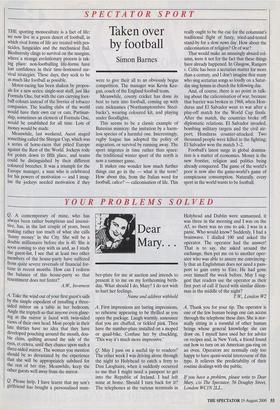SPECTATOR SPORT
Taken over by football
Simon Barnes
THE sporting monoculture is a fact of life: we now live in a green desert of football, in which rival forms of life are treated with pes- ticides, fungicides and the mechanical flail. Biodiversity clings to survival on the margins, where a strange evolutionary process is tak- ing place: non-footballin' g life-forms have lost confidence in their time-honoured sur- vival strategies. These days, they seek to be as much like football as possible.
Motor-racing has been shaken by propos- als for a new series: single-seat stuff, just like Formula One, but with the cars carrying foot- ball colours instead of the liveries of tobacco companies. The leading clubs of the world would have their own car or cars. Partisan- ship, sometimes an element of Formula One, would be established for all time. Lots of money would be made.
Meanwhile, last weekend, Ascot staged something called the Shergar Cup, which was a series of horse-races that pitted Europe against the Rest of the World. Jockeys rode for points down to fifth place, and teams could be distinguished by their different coloured breeches. It was a triumph for the Europe manager, a man who is celebrated for his powers of motivation — and I imag- me the jockeys needed motivation if they were to give their all to an obviously bogus competition. The manager was Kevin Kee- gan, coach of the England football team.
Meanwhile, county cricket has done its best to turn into football, coming up with cute nicknames (`Northamptonshire Steel- backs'), wearing coloured kit, and playing under floodlights.
This seems to be a classic example of Batesian mimicry: the imitation by a harm- less species of a harmful one. Interestingly, rugby league has adopted the policy of migration, or survival by running away. The sport migrates in time rather than space: the traditional winter sport of the north is now a summer game.
It makes one wonder how much further things can go in the — what is the term? How about this, from the Italian word for football, calico? — caliconisation of life. This really ought to be the cue for the columnist's traditional flight of fancy, tried-and-tested stand-by for a slow news day. How about the caliconisation of religion? Or of war?
That would make an amusingly absurd col- umn, were it not for the fact that these things have already happened. In Glasgow, Rangers v. Celtic has been a sectarian matter for more than a century, and I don't imagine that many who sing sectarian songs so loudly on a Satur- day sing hymns in church the following day.
And, of course, there is no point in talk- ing about the caliconisation of war, because that barrier was broken in 1968, when Hon- duras and El Salvador went to war after a play-off match for the World Cup finals. After the match, the countries broke off diplomatic relations. El Salvador invaded, bombing military targets and the civil air- port; Honduras counter-attacked. Two thousand people were killed in the fighting; El Salvador won the match 3-2.
Football's latest surge in global domina- tion is a matter of economics. Money is the new frontier, religion and politics being already conquered. The game of the world's poor is now also the game-world's game of conspicuous consumption. Naturally, every sport in the world wants to be football.


























































 Previous page
Previous page